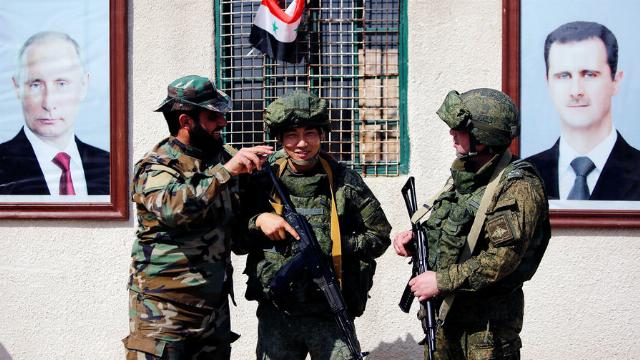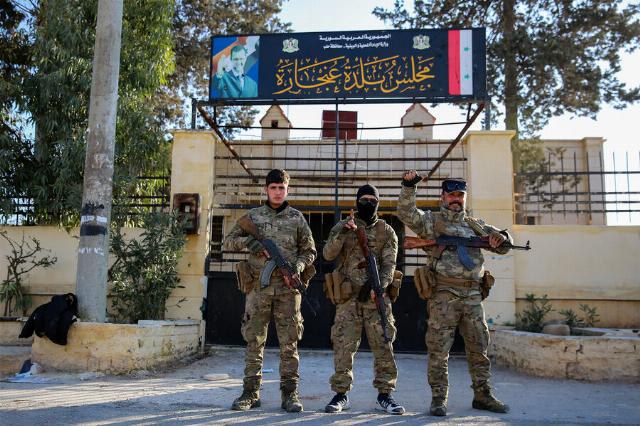Colonel Khodarenok called the real threat of the capture of Aleppo by rebels in Syria
Several groups in Syria have launched an offensive on Aleppo, approaching the outskirts of the city. The escalation was the first serious clash between the rebels and the government army since March 2022, when a cease-fire agreement was reached with the mediation of Moscow and Ankara. What is happening in Syria, why there is a "golden opportunity" for the rebel offensive and whether Aleppo can fall - in the material of the military observer of the Newspaper.En" by Mikhail Khodarenka.
What happened?
The fighting in northwestern Syria began at dawn on November 27, when opponents of Bashar al-Assad launched a surprise operation called "Response to Aggression," which they linked to recent shelling by government forces of areas held by opposition groups.
The battles unfolded in areas controlled by the Hayat Tahrir al-Sham group (the organization is recognized as a terrorist organization in the Russian Federation and banned), about 10 km west of the city of Aleppo. Some rebel formations linked to the Turkish-backed Syrian National Army (SNA) have joined the operation.
The forces of the HTS and allied formations are rapidly moving forward, capturing large areas of territory and rapidly approaching the outskirts of Aleppo. At the moment, opposition detachments have seized many facilities, including the strategic military base 46, the settlement of Urem el Kuba and the city of Anjara.
According to CNN, in one day of the operation, groups opposed to Bashar al-Assad took control of more than 40 towns, villages and settlements in rural Idlib and Aleppo. The rebels have entered the western outskirts of Aleppo from Khan al-Assal and are currently fighting on the outskirts of the city.
The HTS and its supporting groups blocked the M5 Damascus-Aleppo international highway in the city of Al-Zarba in the suburbs of Aleppo, and also control the junction of the M4 and M5 international highways in the city of Saraqib, which led to a traffic stop on these highways.
For its part, the Syrian army has begun to counterattack the positions of armed militants in the countryside of Aleppo and Idlib. This is reported by Al Mayadeen TV channel. According to Reuters, Russian and Syrian warplanes bombed rebel-controlled northwest Syria near the border with Turkey on November 28 to repel the offensive.
Why is there an opportunity for an offensive?
According to experts from the Institute of the Middle East, the success of the opposition groups was facilitated by the fact that Hezbollah formations, which had previously largely determined the development of the situation in Syria, suffered a heavy defeat in hostilities with the Israel Defense Forces. After him, Hezbollah formations turned from an organized army into disparate detachments without firm leadership.
Meanwhile, several Turkish military sources declined to comment positively or negatively on whether Turkey had given the "green light" that allowed the rebels to launch the operation.
Reuters quoted Turkish security sources as saying that "opposition groups in northern Syria launched a limited operation after attacks by Syrian government forces on the de-escalation zone in Idlib, but expanded it after government forces left their positions."
CNN, citing a senior Turkish security source, reported that Ankara was trying to prevent the offensive in order to avoid escalating tensions in the region, especially given the Israeli fighting in the Gaza Strip and Lebanon. However, attempts to use the channels created under the 2019 de-escalation agreement to stop Russian and Syrian government airstrikes on residential areas of Idlib province have not been successful. Therefore, what was originally planned as a limited operation expanded when Assad's forces began to leave their positions.
One of the SNA commanders in charge of the current operation said that the geopolitical events in the Middle East, which affected Assad's allies, created a "golden opportunity" for the offensive of opposition forces. His statements are quoted by the portal Middle East Eye (MEE).
And what about Russia?
The commander of the Syrian National Army, who preferred to remain anonymous because he is not allowed to comment, told MEE:
"The international situation is conducive to this battle and chaos between Assad and his supporters, and we took advantage of this opportunity.
We are able to change the situation, reclaim our lands and provide a safe way for displaced people to return to their homes. This time, the capabilities of the Russian air forces are limited, probably due to the fact that the Russians are busy with the war in Ukraine and the return of a number of their aircraft from Syria."
The progress made by the opposition groups in such a short period of time most likely indicates the absence of real resistance from the formations of official Damascus.
 |
| Russian and Syrian soldiers on the background of portraits of Presidents Vladimir Putin and Bashar al-Assad at a checkpoint in Damascus, March 2018. |
| Source: Russian and Syrian military personnel |
Perhaps this is due to the lack of sufficient support from the allies, since Russian aircraft did not participate in a number of armed clashes between government forces and opposition, and the participation of pro-Iranian militias in the battles was not obvious.
Moreover, the state of the government army is characterized by some observers as disintegration, which, in their opinion, played a decisive role in the retreat of Assad's forces from vast territories in just one day of fighting.
The fighting in northern Syria began due to the intransigence of the Assad government and its refusal to make any attempts to advance the political process, which has stalled since 2022. If this process is expanded, then official Damascus will be forced to reconsider its position, according to the Institute of the Middle East.
In addition, Damascus refused to approach Ankara through the mediation of the Russian side, and the Syrian president even declined an invitation from Turkish President Recep Tayyip Erdogan to hold a summit meeting to end years of estrangement and hostility between the two sides. So it is quite possible that the operation on the so-called "deterrence of aggression" is part of Turkey's reaction to Assad's intransigence.
Currently, there is a real threat to Aleppo, which has been held by government forces since 2016, and, moreover, to the proclamation of the "government of Free Syria" in this city. In short, events in the north of this country are developing rapidly and are clearly unpredictable.
The opinion of the author may not coincide with the position of the editorial board.
Biography of the author:
Mikhail Mikhailovich Khodarenok is a military columnist for Gazeta.Ru", retired colonel.
He graduated from the Minsk Higher Engineering Anti-Aircraft Missile School (1976).
Military Air Defense Command Academy (1986).
Commander of the S-75 anti-aircraft missile division (1980-1983).
Deputy commander of the anti-aircraft missile regiment (1986-1988).
Senior Officer of the General Staff of the Air Defense Forces (1988-1992).
Officer of the Main Operational Directorate of the General Staff (1992-2000).
Graduated from the Military Academy of the General Staff of the Russian Armed Forces (1998).
Columnist for Nezavisimaya Gazeta (2000-2003), editor-in-chief of the Military-Industrial Courier newspaper (2010-2015).
Mikhail Khodarenok

